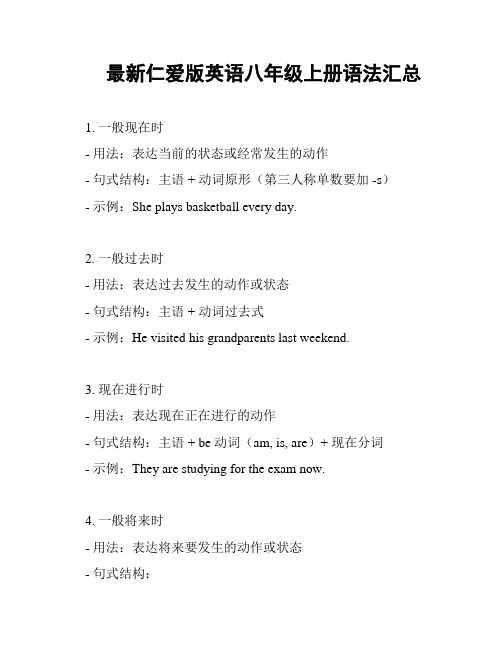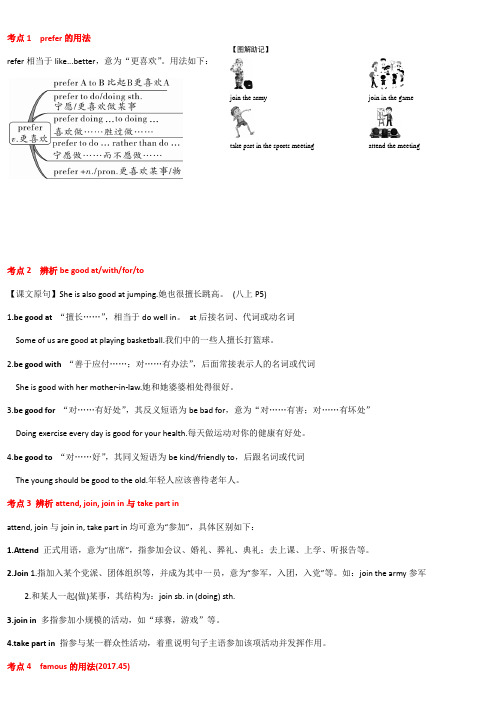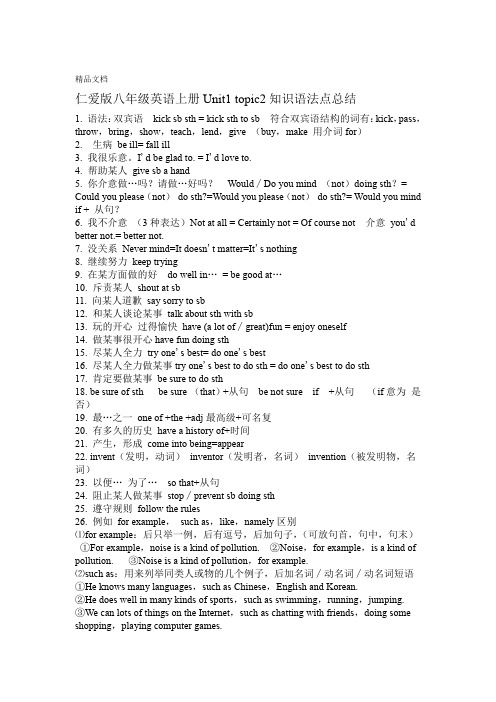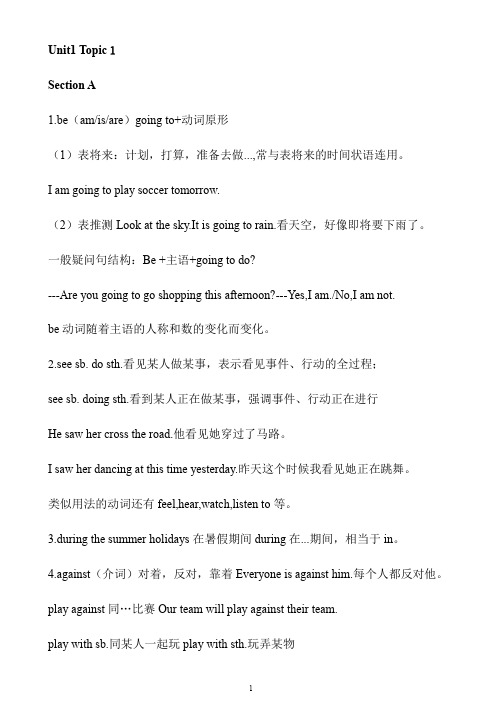仁爱版八年级英语上册动词用法的形式归纳
仁爱版英语八年级上册知识点归纳

仁爱版英语八年级上册知识点归纳一、Unit 11.重点词汇:festival, custom, occasion, traditional, celebrate, annual, superstition2.语法:一般现在时和现在进行时3.重点句型:How do you celebrate the Spring Festival? I usually clean the house and have a big family dinner.二、Unit 21.重点词汇:adventure, explore, wander, journey, destination, route, scenery2.语法:一般过去时和过去进行时3.重点句型:We visited the Great Wall and took many photos.三、Unit 31.重点词汇:charity, donation, organization, fund, poverty, volunteer, campaign2.语法:情态动词can, could, may, might表请求、允许、建议、批准等3.重点句型:Can I join the charity bike ride? Sure, you can.四、Unit 41.重点词汇:weather forecast, hurricane, tornado, thunderstorm, lightning, disaster, rescue2.语法:虚拟语气3.重点句型:If I were you, I would take an umbrella because it may rain this afternoon.五、Unit 51.重点词汇:talent show, contestant, judge, round, applause, champion, performance2.语法:感叹句3.重点句型:What a wonderful performance!六、Unit 61.重点词汇:hobby, furniture, instrument, recipe, exhibition, display, masterpiece2.语法:动词不定式3.重点句型:She likes to play the piano in her free time.七、Unit 71.重点词汇:environment, pollution, recycle, global warming, carbon dioxide, emissions, alternative2.语法:虚拟语气3.重点句型:If we don't take action now, the environment will bein great danger.八、Unit 81.重点词汇:vacation, destination, souvenir, guidebook, sightseeing, journey, amodation2.语法:宾语从句3.重点句型:I want to know where you are going for vacation.以上是仁爱版英语八年级上册的知识点归纳。
仁爱版英语八年级上知识点归纳

仁爱版英语八年级上知识点归纳八年级上册的英语教材是中学生英语学习的重要阶段,学习内容涵盖了语法、词汇、听说读写等各个方面的知识。
下面将对仁爱版英语八年级上册的知识点进行归纳和总结,以帮助同学们更好地学习和复习。
一、语法知识点1. 一般现在时:描述经常性的动作或现实情况。
例如:I usually go to school by bus.2. 一般过去时:描述过去某个时间发生的动作或存在的状况。
例如:He played football yesterday.3. 现在进行时:表示现阶段正在进行的动作。
例如:She is watching TV now.4. 一般将来时:表示将来某个时间或某个动作会发生。
例如:I will go to the park tomorrow.5. 情态动词can:表示能力、许可和请求等。
例如:I can play the piano.6. 情态动词should:表示建议、责任和必要等。
例如:You should listen to your parents.7. 动词不定式:表示目的、愿望和计划等。
例如:I want to be a teacher.8. 动词的-ing形式:作主语、宾语、表语和状语等。
例如:Swimming is my favorite sport.二、词汇知识点1. 数字:zero, one, two, three, four, five, six, seven, eight, nine, ten等。
2. 颜色:red, blue, green, yellow, black, white, pink等。
3. 学科:math, English, Chinese, history, geography, PE等。
4. 动物:dog, cat, bird, fish, tiger, panda, monkey, elephant等。
5. 食物:noodles, rice, bread, milk, juice, apple, banana等。
仁爱版八年级上册英语知识点总结(最新最全)

八年级上英语语法1)IeaVe的用法1.“leave+地点”表示“离开某地”。
例如:When did you IeaVe Shanghai?你什么时候离开上海的?2.“leave for+地点”表示“动身去某地”。
例如:NeXt Friday, AIiCe is IeaVing for London. 下周五,爱丽斯要去伦敦了。
3.“leave+地点+for+地点”表示“离开某地去某地"。
例如:Why are you IeaVing Shanghai for Beijing?你为什么要离开上海去北京?2)情态动词ShOUld “应该”学会使用ShOUld作为情态动词用,常常表示意外、惊奇、不能理解等,有“竟会”的意思,例如: HOw ShOUld I know?我怎么知道?Why ShOUId you be SO Iate today?你今天为什么来得这么晚?ShOUld有时表示应当做或发生的事,例如:We ShOUId help each other.我们应当互相帮助。
我们在使用时要注意以下几点:1.用于表示"应该”或“不应该”的概念。
此时常指长辈教导或责备晚辈。
例如:YOU ShOUld be here With CIean hands.你应该把手洗干净了再来。
2.用于提出意见劝导别人。
例如:YOU ShOUICI go to the doctor if you feel ill.如果你感觉不舒服,你最好去看医生。
3.用于表示可能性。
S hoUICl的这一用法是考试中常常出现的考点之一。
例如:We ShOUld arrive by SUPPer time.我们在晚饭前就能到了。
She ShOUId be here any moment.她随时都可能来。
31.What与WhiCh都是疑问代词,都可以指人或事物,但是What仅用来询问职业。
如:Whatis your father? 你父亲是干什么的?该句相当于:What does your father do?What is your father'S job?WhiCh指代的是特定范围内的某一个人。
最新仁爱版英语八年级上册语法汇总

最新仁爱版英语八年级上册语法汇总
1. 一般现在时
- 用法:表达当前的状态或经常发生的动作
- 句式结构:主语 + 动词原形(第三人称单数要加 -s)
- 示例:She plays basketball every day.
2. 一般过去时
- 用法:表达过去发生的动作或状态
- 句式结构:主语 + 动词过去式
- 示例:He visited his grandparents last weekend.
3. 现在进行时
- 用法:表达现在正在进行的动作
- 句式结构:主语 + be 动词(am, is, are)+ 现在分词
- 示例:They are studying for the exam now.
4. 一般将来时
- 用法:表达将来要发生的动作或状态
- 句式结构:
- 主语 + will + 动词原形(肯定句)
- 主语 + won't + 动词原形(否定句)
- Will + 主语 + 动词原形?(疑问句)
- 示例:I will finish my homework later.
5. 现在完成时
- 用法:表达过去发生的但与现在相关的动作或状态
- 句式结构:主语 + have/has + 过去分词
- 示例:She has already eaten lunch.
以上是最新仁爱版英语八年级上册的语法汇总。
语法知识的掌握对于学习英语非常重要,希望以上内容能帮助你更好地理解和应用语法规则。
如果有任何疑问,请随时向我提问。
新仁爱英语八年级上下册语法考点大全

考点1 prefer 的用法refer 相当于like...better ,意为“更喜欢”。
用法如下:考点2 辨析be good at/with/for/to【课文原句】She is also good at jumping.她也很擅长跳高。
(八上P5)1.be good at “擅长……”,相当于do well in 。
at 后接名词、代词或动名词Some of us are good at playing basketball.我们中的一些人擅长打篮球。
2.be good with “善于应付……;对……有办法”,后面常接表示人的名词或代词She is good with her motherinlaw.她和她婆婆相处得很好。
3.be good for “对……有好处”,其反义短语为be bad for ,意为“对……有害;对……有坏处”Doing exercise every day is good for your health.每天做运动对你的健康有好处。
4.be good to “对……好”,其同义短语为be kind/friendly to ,后跟名词或代词The young should be good to the old.年轻人应该善待老年人。
考点3 辨析attend, join, join in 与take part inattend, join 与join in, take part in 均可意为“参加”,具体区别如下:1.Attend 正式用语,意为“出席”,指参加会议、婚礼、葬礼、典礼;去上课、上学、听报告等。
2.Join 1.指加入某个党派、团体组织等,并成为其中一员,意为“参军,入团,入党”等。
如:join the army 参军2.和某人一起(做)某事,其结构为:join sb. in (doing) sth.3.join in 多指参加小规模的活动,如“球赛,游戏”等。
英语八年级上册语法知识点仁爱版

英语八年级上册语法知识点仁爱版一、一般现在时1. 概念:表示经常发生的动作或存在的状态。
2. 构成:动词原形或第三人称单数形式。
3. 用法:表示经常性、习惯性的动作或存在的状态,也表示现在的特征或状态。
如:He often helps his mother do the housework. 他经常帮他妈妈做家务。
4. 特殊用法:表示主语具备的性格和能力,也可以表示客观事实或普遍真理。
如:She can sing this song in English. 她能用英语唱这首歌。
二、现在进行时1. 概念:表示正在进行的动作或存在的状态。
2. 构成:be动词(am/is/are)+动词的现在分词形式(-ing)。
3. 用法:表示正在进行的动作或存在的状态,强调的是正在发生的事情。
如:They are studying in the classroom. 他们在教室里学习。
4. 特殊用法:表示将来发生的动作,也可以表示过去发生的动作。
如:He is coming to see you tomorrow. 他明天要来看你。
(表示将来) They were having a meeting at this time yesterday. 昨天这个时候他们在开会。
(表示过去)三、现在完成时1. 概念:表示已经完成的动作或存在的状态,对现在产生的影响或结果。
2. 构成:have/has + 过去分词。
3. 用法:表示过去发生的动作已经完成,对现在产生的影响或结果。
如:I have finished my homework. 我已经完成了我的作业。
4. 特殊用法:可以表示发生在过去的动作延续到现在,也可以表示过去发生的动作与现在的状态有关。
如:He has lived here since 2000. 他从2000年就住在这里了。
(表示过去的动作延续到现在)They have been married for five years. 他们结婚已经五年了。
最新仁爱版八年级英语上册Unittopic2知识语法点总结

精品文档仁爱版八年级英语上册Unit1 topic2知识语法点总结1.语法:双宾语kick sb sth = kick sth to sb 符合双宾语结构的词有:kick,pass,throw,bring,show,teach,lend,give (buy,make 用介词for)2.生病be ill= fall ill3.我很乐意。
I'd be glad to. = I'd love to.4.帮助某人give sb a hand5.你介意做…吗?请做…好吗?Would∕Do you mind (not)doing sth?= Could you please(not)do sth?=Would you please(not)do sth?= Would you mind if + 从句?6.我不介意(3种表达)Not at all = Certainly not = Of course not 介意you'd better not.= better not.7.没关系Never mind=It doesn't matter=It's nothing8.继续努力keep trying9.在某方面做的好do well in…= be good at…10. 斥责某人shout at sb11. 向某人道歉say sorry to sb12. 和某人谈论某事talk about sth with sb13. 玩的开心过得愉快have (a lot of∕great)fun = enjoy oneself14. 做某事很开心have fun doing sth15. 尽某人全力try one's best= do one's best16. 尽某人全力做某事try one's best to do sth = do one's best to do sth17. 肯定要做某事be sure to do sth18. be sure of sth be sure (that)+从句be not sure if +从句(if意为是否)19. 最…之一one of +the +adj最高级+可名复20. 有多久的历史have a history of+时间21. 产生,形成come into being=appear22. invent(发明,动词)inventor(发明者,名词)invention(被发明物,名词)23. 以便…为了…so that+从句24. 阻止某人做某事stop∕prevent sb doing sth25. 遵守规则follow the rules26. 例如for example,such as,like,namely区别⑴for example:后只举一例,后有逗号,后加句子,(可放句首,句中,句末)①For example,noise is a kind of pollution. ②Noise,for example,is a kind of pollution. ③Noise is a kind of pollution,for example.⑵such as:用来列举同类人或物的几个例子,后加名词∕动名词∕动名词短语①He knows many languages,such as Chinese,English and Korean.②He does well in many kinds of sports,such as swimming,running,jumping.③We can lots of things on the Internet,such as chatting with friends,doing some shopping,playing computer games.精品文档.精品文档⑶Like:与such as用法一致⑷Namely:即,也就是。
初中英语 仁爱版八年级上册Unit1Topic1知识点

Unit1 Topic1Section A1.be(am/is/are)going to+动词原形(1)表将来:计划,打算,准备去做...,常与表将来的时间状语连用。
I am going to play soccer tomorrow.(2)表推测Look at the sky.It is going to rain.看天空,好像即将要下雨了。
一般疑问句结构:Be +主语+going to do?---Are you going to go shopping this afternoon?---Yes,I am./No,I am not.be动词随着主语的人称和数的变化而变化。
2.see sb. do sth.看见某人做某事,表示看见事件、行动的全过程;see sb. doing sth.看到某人正在做某事,强调事件、行动正在进行He saw her cross the road.他看见她穿过了马路。
I saw her dancing at this time yesterday.昨天这个时候我看见她正在跳舞。
类似用法的动词还有feel,hear,watch,listen to等。
3.during the summer holidays在暑假期间during在...期间,相当于in。
4.against(介词)对着,反对,靠着Everyone is against him.每个人都反对他。
play against同…比赛Our team will play against their team.play with sb.同某人一起玩play with sth.玩弄某物I often play with my friends. The cat is playing with a ball.against作为介词,还有“紧靠;倚”的意思。
Eg:Put the piano there,against the wall.把钢琴放在那,紧靠着墙。
- 1、下载文档前请自行甄别文档内容的完整性,平台不提供额外的编辑、内容补充、找答案等附加服务。
- 2、"仅部分预览"的文档,不可在线预览部分如存在完整性等问题,可反馈申请退款(可完整预览的文档不适用该条件!)。
- 3、如文档侵犯您的权益,请联系客服反馈,我们会尽快为您处理(人工客服工作时间:9:00-18:30)。
仁爱版英语七--八上册动词一些用法的形式归纳
形式主要有(以do为代表):
1 原形do;2单三形式does;3 现在分词(或动名词)doing;4过去式did;5不定式to do
一、使用(带to)不定式:
1、It’s + adj + to do sth 做某事如何/怎样……
例:It’s easy/difficult/important/necessary(for sb.) to do….
(对某人来说)做某事容易/困难/重要/必要(客观事实类形容词)……
区别:It’s careless, clever, good, foolish, honest, kind, lazy, nice, right, silly, stupid, wise(of sb)to do sth
(对某人来说)做某事粗心/聪明/好的/蠢的……(对人评价的形容词)
2、It's time + to do sth 做某事的时间到了/该做某事
3、It's a good time + to do sth 现在是做某事的好时间
4、It’s the best time + to do sth 现在是做某事的最好
时间
5、It’ s one’s turn to do sth 轮到某人做某事
以下注意“动词+to do ”的搭配
6、want to do sth = would like to do sth 想要做某事(2个)
7、like to do sth 想要做某事
8、plan to do sth 计划/ 打算做某事
9、hope to do sth = wish to do sth 希望做某事(2个)
10、begin to do sth = start to do sth 开始做某事(2个)
11、go to do sth 去做某事12、learn to do sth学会做某事
13、teach sh to do sth 教某人做某事
14、ask sb (not)to do sth 请/叫某人(别)做某事
15、tell sb (not)to do sth 叫/吩咐/告诉某人(别)做某事
16、have no time to do sth 没有时间做某事
17、get sb to do sth 让某人做某事
18、hope sb. to do sth. 希望某人做某事(wish则无此用法)
19、take turns to do sth 轮流做某事
20、remember to do sth 要记得做某事(事情还没有做)
21、forget to do sth 忘记做某事(事情还没有做)
22、help sb (to)do sth帮助某人做某事(to常省略)
23、be afraid/happy/glad… + to do sth 害怕/高兴/乐意……做某
事
24、happen to do sth碰巧发生某事
25、use sth to do sth使用某物做某事
26、be sure to do sth务必/肯定/一定做某事
27、be free to do sth有空做某事
28、something to do(例:something to eat/drink 吃的东西,喝的东西)
(这里的不定式作为后置定语,修饰something)
29、have sth to do 有某事要做
30、be afaid to do sth.害怕做某事
二、使用动词原形+do:
1、Why not + do sth …? 为什么不做某事
(=Why don’t you/we do sth….?)
2、have to do sth 不得不做某事
3、had better do sth 最好做某事
4、let sb do sth 让某人某事
5、make sb. (not )do sth. 使/让某人(别)做某事
5、情态动词(can/ could/must/would/may/should/might/had better/have
to/(need)等)之后动词用原形
6. see/watch/hear/feel sb do sth. 看到/听到/感觉到某人做过某事
三、使用-ing 形式
1、介词+ doing sth
①What about doing sth = How about doing sth 做某事怎么样?
②be good at doing sth=do well in doing sth 擅长于做某事
③It’s time for doing sth. 该做某事了
④Thank you for doing sth. 因做某事而感谢某人
⑤take turns in doing sth 轮流做某事
2、be busy doing sth 忙于做某事
3 go swimming/shopping/dancing/hiking/skating/skiing/climbing
去游泳/购物/跳舞/远足/滑冰/滑雪/爬山……(搭配较固定)
4、There be +名词+doing sth 有正在做某事的……
如:There is a girl dancing in the room. 在房间里有一个正在跳舞的男孩。
1 / 2
5、enjoy doing sth 喜欢做某事
6、finish doing sth 已完成做某事
7、keep doing sth. 继续/持续做某事
8、keep sb. doing sth. 让某人一直做某事
9、hate doing sth. 讨厌/憎恨做某事
10、feel like doing sth. 感觉想做某事
11、give up doing sth. 放弃/停止做某事,戒掉……
12、practice doing sth. 练习做……
13、prefer doing sth. 更喜欢做某事(prefer to do sth宁愿做某事)
14、Would you mind (not) doing sth….?
请你做……,好么?/你不介意做……吧?
Would you mind (one’s) doing sth….? (某人)做……你介意么?
15、hear/see/watch sb doing sth 听到/看到某人正在做某事
16、remember doing sth 记得曾经做过某事(事情已经做过)
17、forget doing sth 忘记曾经做过某事(事情已经做过)
18、Doing sth is + 形容词…做某事如何……
例:Getting up early is good for health.
特别注意以上用法中
A.既用doing也用动词不定式to do且意思差别不大:
like doing sth./to do sth. 喜欢做某事
begin/start doing sth./to do sth. 开始做某事
B. 既用ing也用to动词不定式且意思不同:
1. remember doing sth. )
remember to do sth. 记得做某事(未做)
2.see /watch/hear/feel sb doing 看到/听到/感觉到某人正在做某事
see/watch/hear/feel sb do sth. 看到/听到/感觉到某人做过某事
3. stop doing sth. 停止做(手头正做的)某事
stop to do sth. 停下来做(别的)某事
4. go on doing sth. 继续做(原来)的某事
go on to do sth. 继续做(别的)某事
附录★某些特定的动词后面接ving作宾语---顺口溜Avoid, miss, put off 避免错过少延期
Advise, finish, practice 建议完成多练习
Enjoy, imagine, can’t help 喜欢想象禁不住
Admit, deny, envy,承认否定与嫉妒
Escape, risk, excuse 逃避冒险莫原谅
Allow/permit appreciate consider 允许感激和考虑
Understand ,encourage ,forbid 明白鼓励要禁止
友情提示:范文可能无法思考和涵盖全面,供参考!最好找专业人士起草或审核后使用,感谢您的下载!。
